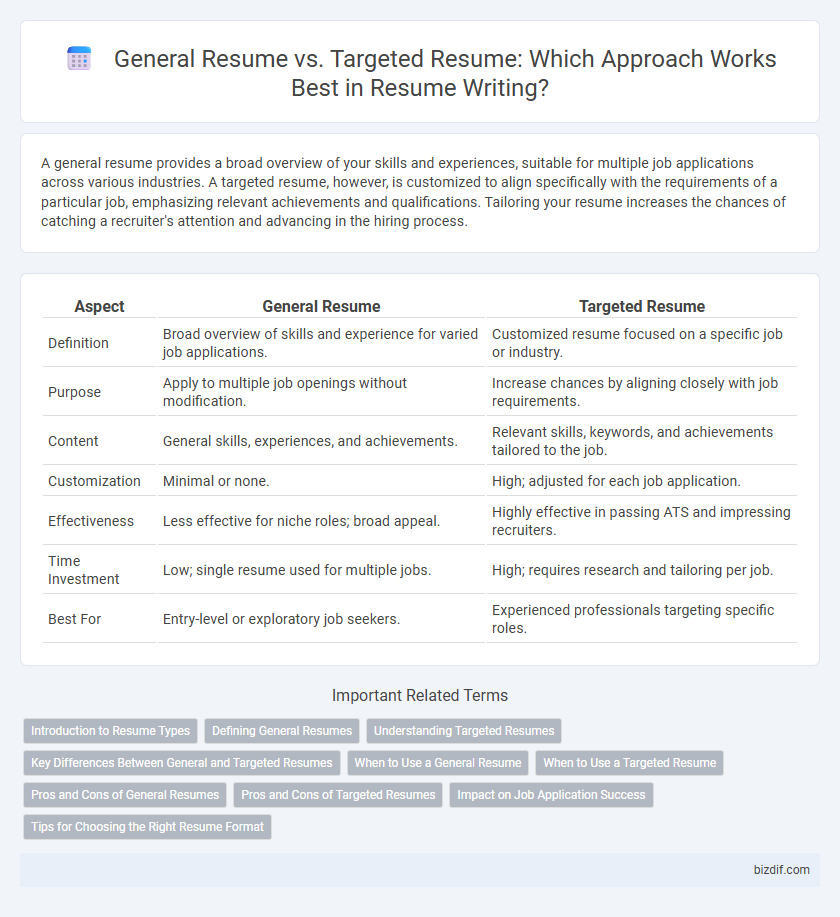A general resume provides a broad overview of your skills and experiences, suitable for multiple job applications across various industries. A targeted resume, however, is customized to align specifically with the requirements of a particular job, emphasizing relevant achievements and qualifications. Tailoring your resume increases the chances of catching a recruiter's attention and advancing in the hiring process.
Table of Comparison
| Aspect | General Resume | Targeted Resume |
|---|---|---|
| Definition | Broad overview of skills and experience for varied job applications. | Customized resume focused on a specific job or industry. |
| Purpose | Apply to multiple job openings without modification. | Increase chances by aligning closely with job requirements. |
| Content | General skills, experiences, and achievements. | Relevant skills, keywords, and achievements tailored to the job. |
| Customization | Minimal or none. | High; adjusted for each job application. |
| Effectiveness | Less effective for niche roles; broad appeal. | Highly effective in passing ATS and impressing recruiters. |
| Time Investment | Low; single resume used for multiple jobs. | High; requires research and tailoring per job. |
| Best For | Entry-level or exploratory job seekers. | Experienced professionals targeting specific roles. |
Introduction to Resume Types
General resumes provide a broad overview of skills and experience suitable for multiple job applications, while targeted resumes are customized to highlight specific qualifications relevant to a particular position. Employers often prefer targeted resumes because they directly address job requirements, increasing the chance of passing applicant tracking systems. Understanding the difference between these resume types is crucial for effective job search strategies and career advancement.
Defining General Resumes
A general resume provides a broad overview of skills, work history, and education without tailoring information to a specific job or industry. It emphasizes versatile qualifications and experiences applicable to multiple roles, making it suitable for job seekers exploring diverse opportunities. This approach maximizes reach but may lack the precision that targeted resumes offer in matching employer-specific requirements.
Understanding Targeted Resumes
Targeted resumes are specifically tailored to align with a particular job description, emphasizing relevant skills, experiences, and accomplishments that match the employer's requirements. Unlike general resumes, which provide a broad overview of qualifications, targeted resumes increase the chances of passing applicant tracking systems (ATS) and capturing recruiters' attention. Crafting a targeted resume involves analyzing job postings thoroughly and customizing keywords and achievements to demonstrate clear fit and value for the specific role.
Key Differences Between General and Targeted Resumes
General resumes provide a broad overview of skills and experience suitable for multiple job applications, emphasizing versatility over specificity. Targeted resumes are customized to align closely with job descriptions, highlighting relevant accomplishments and keywords that match employer requirements. This focused approach increases the likelihood of passing applicant tracking systems and catching recruiter attention effectively.
When to Use a General Resume
A general resume is ideal for job seekers exploring multiple industries or roles without a specific position in mind, providing a broad overview of skills and experiences. It serves best during the early stages of a job search or when applying to various employers who require a versatile profile. General resumes emphasize transferable skills and overall qualifications rather than tailored job descriptions or specific keywords.
When to Use a Targeted Resume
A targeted resume is ideal when applying for a specific job or role, as it highlights relevant skills, experiences, and keywords tailored to that position, increasing the chances of passing applicant tracking systems (ATS). Use a targeted resume when employers seek particular qualifications, certifications, or industry-specific expertise that closely match your background. Customizing your resume to address the job description directly demonstrates alignment with the employer's needs and improves overall application effectiveness.
Pros and Cons of General Resumes
General resumes are versatile and save time by providing a broad overview of skills and experiences for multiple job applications, making them ideal for candidates new to the job market or exploring various industries. However, they lack customization, which can result in lower relevance for specific roles and reduce the chances of passing applicant tracking systems (ATS) that prioritize targeted keywords. Using a general resume may lead to missed opportunities when competing against specialized resumes tailored to employer needs and job descriptions.
Pros and Cons of Targeted Resumes
Targeted resumes focus on tailoring content to a specific job role, increasing the chances of passing applicant tracking systems (ATS) and capturing recruiters' attention with relevant keywords. The main advantage is their ability to highlight specific skills and experiences that directly match the job description, resulting in higher interview rates. However, creating multiple targeted resumes can be time-consuming and requires ongoing customization for each application, potentially limiting the volume of job submissions.
Impact on Job Application Success
Targeted resumes significantly increase job application success by tailoring skills and experiences to specific job descriptions, resulting in higher recruiter engagement and interview rates. General resumes lack this customization and often appear less relevant, decreasing the likelihood of passing applicant tracking systems (ATS) and attracting hiring managers' attention. Research shows that candidates with targeted resumes receive up to 40% more callbacks compared to those relying on general resumes.
Tips for Choosing the Right Resume Format
Selecting the appropriate resume format depends on your career goals and job application context. Use a general resume to showcase a broad range of skills and experiences when applying to multiple roles, while a targeted resume highlights specific achievements and keywords tailored to a particular job posting. Prioritize clarity, relevance, and alignment with the job description to increase the chances of passing applicant tracking systems (ATS) and catching recruiters' attention.
General Resume vs Targeted Resume Infographic

 bizdif.com
bizdif.com